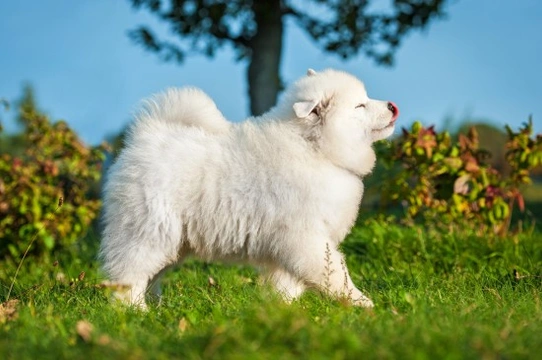
Samoyed dog hereditary health and health testing
The Samoyed dog is a pure white and very fluffy dog that originated in Siberia in the frozen east of Russia. They were originally used by the nomadic people of the region as sled dogs, but today, have been widely distributed all over the world and are popular within the UK as pets and companions.
The Samoyed is a medium sized breed that can stand up to 22” tall at the withers, and weigh up to 25kg, with males of the breed being slightly larger than females. They belong to the spitz dog grouping, and have the typical spitz dog traits of pointed, upright ears, a curled tail, and a profuse and very thick coat.
Their coats are double layered, with a very dense undercoat to provide warmth, and a top layer of coarser guard hairs. Again, like most spitz dogs, they tend to shed their hair heavily all year round, and twice a year, will blow their coat for the new season, shedding all of their prolific undercoat in the space of just a couple of weeks. The Samoyed’s colour is white, with pure white being the most common colour, but it can also be found in a cream or biscuit shade too.
If you are wondering if the Samoyed dog is right for you, it is important to do plenty of research into the main traits of the breed, as well as finding out as much as possible about their general health, longevity, and if any health tests are advised for dogs of the breed. We will examine these factors in more detail within this article.
Samoyed longevity
The average lifespan of the Samoyed is 12-13 years, which puts them towards the top of the average range across the board for all breeds of a similar size and build, and indicates a general propensity to good health.
Genetic diversity
The coefficient of inbreeding statistic for the Samoyed is 8.5%, which is higher than the 6.25% or less that is considered to be the ideal for pedigree dog breeds. This indicates that the Samoyed is subjected to a degree of inbreeding in order to keep their breed lines viable. Inbreeding is in some cases necessary to maintain the breed, but Samoyed breeders should reduce the coefficient of inbreeding statistic within their own breed lines where possible.
Conformation issues
The build and proportions of the Samoyed dog are considered to be well balanced and fit for life, but the general breed standard can cause a couple of specific problems for the dog.
- The coat of the Samoyed is designed to keep the dog warm in incredibly cold climates, which may lead to overheating in the summer months if the dog cannot cool down adequately. Special care must be taken of the Samoyed in hot weather.
- The shape of the eyes can lead to a condition called medial canthal pocket syndrome, in which the corners of the eyes tilt inwards, creating a pouch into which dirt and debris can collect, potentially irritating the eyes. Whether or not this problem arises will depend on the conformation of the individual dog in question.
Health testing for the Samoyed
The British Veterinary Association and The Kennel Club make certain recommendations for health testing for different breeds of dog, in order to ultimately reduce the occurrence rate of known hereditary health problems within the breed. For the Samoyed dog, the following health schemes and tests are advised:
- Hip score testing, with the breed’s mean hip score being 12.3. Potential parent dogs of the breed should attain a hip score below this figure in order to be considered viable.
- Testing for progressive retinal atrophy and multifocal retinal dysplasia.
- DNA testing for progressive retinal atrophy.
- DNA testing for retinal dysplasia.
- DNA testing for hereditary nephritis, a kidney condition that leads to renal failure.
Other health issues
As well as the conditions listed above that are known to be hereditary and pose a particular risk to dogs of the breed, various other health conditions that are not covered as part of pre-breeding testing schemes have also been found to present within the Samoyed breed as well. The most common of these conditions are:
- Deafness, which may be associated with the gene for the white coat.
- Chronic hepatitis, an autoimmune disorder of the liver.
- Myelopathy, a muscle wasting disorder.
- Hereditary glomerulopathy, causing progressive kidney failure.
- Hyperadrenocorticism, leading to excessive thirst and urination, and loss of hair.
- Hypomyelinating neuropathy, a tremor disorder.
- Sebaceous adenitis, an autoimmune skin disorder.
- Pulmonic stenosis, a type of heart disease.
- Uveodermatological syndrome, an autoimmune disease that leads to blindness and is ultimately fatal.
- Type one diabetes.
- Adult onset growth hormone response dermatosis.
- Cataracts of the eyes.
- Cancer, including oral squamous cell carcinoma and perianal gland tumours.
- Nasal depigmentation.
- Glaucoma of the eyes.
- Malformed tear ducts.
- Dry eye.



